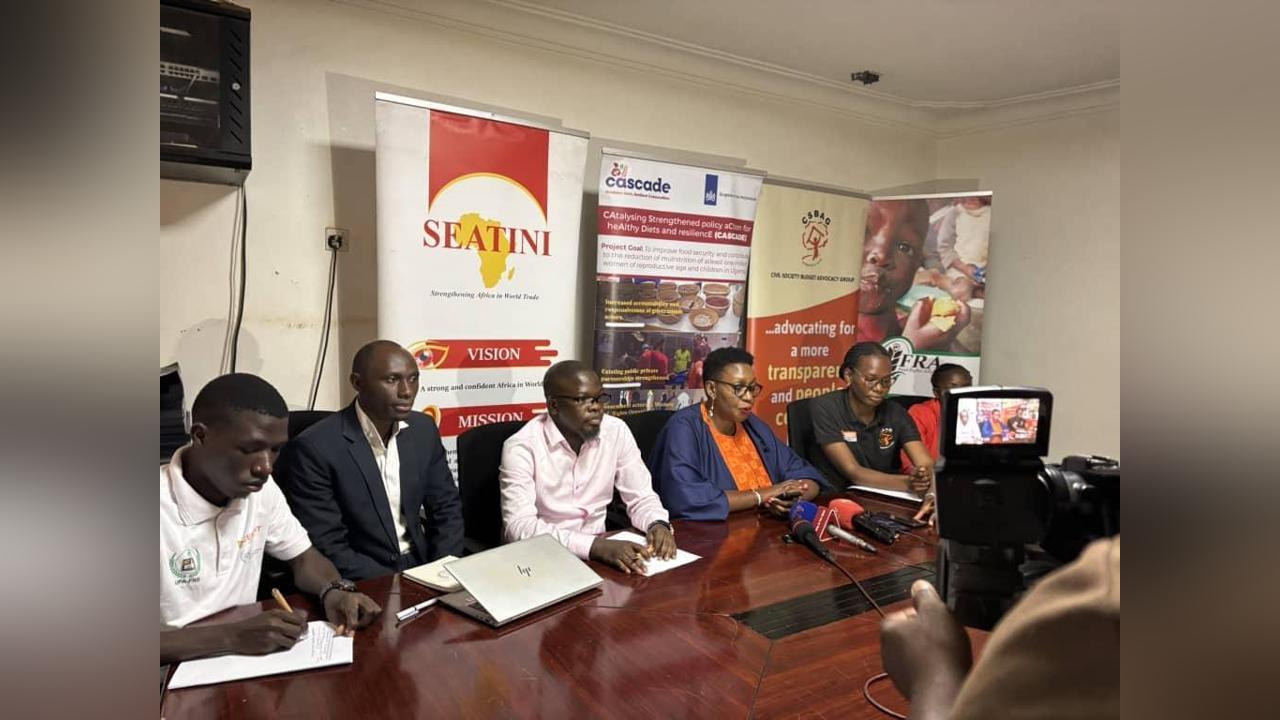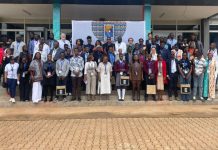Africa-Press – Uganda. Civil Society Organisations (CSOs) have raised concern over a looming food crisis as Uganda enters another election cycle.
The organisations including the Food Rights Alliance (FRA), SEATINI Uganda, CSBAG, CEFROHT, and PELUM Uganda raised the concern on Sunday during a joint press conference held under the theme “We Need to Watch Out! CSOs Warn of a Looming Food Crisis as Uganda Enters Another Election Cycle.”
According to findings from the 2025 IPC Analysis, 16% of Ugandans are currently food insecure.
The organisations noted that hunger has become a recurring trend after every election since 2011, warning that the country could face another post-election food crisis if no urgent action is taken.
They called on the government to take immediate steps to protect households and stabilise food production.
Agnes Kirabo, Executive Director of the Food Rights Alliance, urged Ugandans to take personal responsibility and prepare for possible food shortages.
“After elections, like it or not, take personal responsibility because you will be hungry, and the ‘hungry pants’ cuts in video stomachs. And what we are telling government is that it is your constitutional obligation to make sure that you appear as a responsible government, just like your peers here in the East African region. They have public food stocks,” Kirabo said.
She warned that hunger affects both urban and rural populations and poses a security threat if not addressed.
“You’re ruling over hungry people, and a hungry person is an angry one… We are spending the last coins in our coffers to finance elections while investors are withholding money, and the private sector is frozen,” she added.
Kirabo called on the government to put in place fiscal and institutional safeguards before the elections, and urged Ugandans to save and stock food at household level.
“That food that you now have, just know, you will not have it come February… Let us stock food at individual and household levels, and as government, let us do the same to manage and bring peace in this country,” she said.
PELUM Uganda’s Lawrence Kanakulya urged citizens to vote wisely and prioritise leaders who care about food security.
“Dear Citizens, rise beyond political excitement and vote with purpose. Look closely and critically at your leader’s manifestos and their promises. These should front food and nutrition security, and agricultural transformation,” he said.
Kanakulya also called for better coordination between government and development partners.
“Development partners must align their funding with long-term food security strategies, not short-term relief. Civil society will continue to amplify the voices of the hungry and malnourished, because nutrition is a right, not a privilege,” he added.
He urged Parliament to ensure budget discipline before and after the elections.
“Parliament must ensure budget credibility before and after elections, and stop diverting funds meant for development to finance campaigns. Government should establish public food stocks, maize, rice, and beans ahead of the elections, especially for vulnerable urban communities,” he said.
Benard Bwambale from Consent Uganda noted that government agencies often slow down during election periods due to delays in the release of funds.
“During elections, most ministries, departments, and agencies (MDAs) tend to become relaxed because Government often delays releasing funds, affecting their ability to perform their mandates,” Bwambale said.
CSBAG’s Tina Kabali highlighted that the government budget tends to rise sharply before elections.
“Government budget growth often spikes before elections, as seen in 2015 when the budget increased by 51% to fulfil infrastructure pronouncements made during campaigns,” she said.
She added that the 2024/2025 national budget remained at Shs72 trillion despite earlier expectations of a reduction.
“The 2024/2025 National Budget remained at Shs72 trillion despite expectations of a reduction after repaying the Bank of Uganda, due to Government focus on completing infrastructure projects before elections,” Kabali explained.
She also noted that the 2021 election cycle, coupled with COVID-19 and global disruptions, worsened food insecurity across the country.
From CEFROHT Uganda, Martin Wambona said government must treat food security as a national priority.
“We are asking the Government to treat food security and nutrition as a national priority for social, economic, and political stability. A hungry person may seem weak, but remember, a hungry person has nothing to lose,” he said.
He warned that civil society will take legal action if the government continues to neglect its duty.
“If the government continues to neglect its obligation to ensure the right to food, civil society will take it to court. This is not rhetoric, this is action to protect the right to food in this country,” he cautioned.
SEATINI Uganda’s Hilda Tumuhe observed that election periods often lead to reduced foreign direct investment (FDI) and increased public debt.
“Election periods are associated with reduced foreign direct investment (FDI). For example, FDI dropped by 31% from USD 1.2 billion in 2019 to USD 800 million in 2020 as investors avoid perceived instability and election-related violence,” she said.
“The trend of increasing debt around election periods suggests that public debt acquisition is linked to election-related spending, driven by insufficient domestic revenue,” she added.
The CSOs concluded by urging government to act now, to prevent another round of post-election hunger and ensure stability for all Ugandans.
Source: Nilepost News
For More News And Analysis About Uganda Follow Africa-Press






